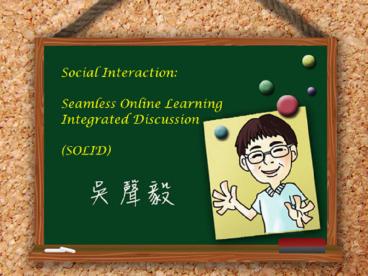PRESENTATION NAME - PowerPoint PPT Presentation
1 / 22
Title: PRESENTATION NAME
1
(No Transcript)
2
Introduce Myself
- ??
- ?????????????????
- ??
- ???????????????
- ???????????????
- ??
- ??????
- ??????
- ????????????????????
- ???????????????????????
3
The two functions of social interaction
- Kreijns, K., Kirschner, P.A., Jochems, W. (2003).
Identifying the pitfalls for social interaction
in computer-supported collaborative learning
environments a review of the research. Computers
in Human Behavior, 19 (3), 335353.
4
MSN Agent
- Hwang, W. Y., Huang, Y. M., Wu, S. Y.
(2011).The Effect of an MSN Agent on Learning
Community and Achievement. Interactive Learning
Environments, 19(4),413-432. (SSCI)
5
Collaboration with Multi-robots
- We examined their collaborative strategies and
their behavioral interactions. - 6 grade elementary school students
- 16 groups, each with three students
6
Lag Sequential Analysis
- Bakeman, R. (1986). Observing interaction an
introduction to sequential analysis. New York
Cambridge University Press. - Lag sequential analysis is the examination of
whether particular sequences of behavior occur
more or less frequently than would be expected by
chance. - It could examine the sequence that a particular
target event would occur subsequent to a given
event having already occurred.
7
LSA Procedure
- Building coding schema
- Data collection
- Observation
- System logs
- Data analysis
- Frequency of Behaviors ??????
- Conditional Probability Calculation????
- Expected frequencies ?????
- Z-Score Calculation Z-SCORE?????
- Draw Transitional Diagram
8
Interaction analysis model (IAM)Gunawardena,
Lowe, and Andersons (1997)
- C1 Sharing/comparing of information????
- C2 Discovery and exploration of dissonance or
inconsistency among participants????? - C3 Negotiation of meaning/co-construction of
knowledge??/?? - C4 Testing and modification of proposed synthesis
or co-construction???? - C5 Agreement statement(s)/application of newly
constructed meaning????/???? - C6 Off-topic????
9
The Cognitive Processing Dimension of the Revised
Blooms TaxonomyAnderson et al. (2001, 2006)
- B1 Remember
- B2 Understand
- B3 Apply
- B4 Analyze
- B5 Evaluate
- B6 Create
- B7 Off-topic
10
Online synchronous collaborative discussion
40 university students Web Design Whole
semester Online synchronous IM tools
IM1(Academic-related) IM11 ???? IM12 ????? IM13
??/?? IM14 ???? IM15 ????/???? IM2(Task
coordination) IM21 ??????? IM22 ????? IM23
????? IM3(Social interaction) IM31 ????/?? IM32
??????? IM33 ??????? IM4(Off-topic) IM41
?????? Hou, H. T., Wu, S. Y. (2011).
Analyzing the social knowledge construction
behavioral patterns of an online synchronous
collaborative discussion instructional activity
using an instant messaging tool A case study.
Computers Education, 57, 14591468. (SSCI, EI)
11
Synchronous Peer Assessment Discussion Activity
- BC (Remember, Understand, Apply) AC (Analyze,
Evaluate, Create) OT (Off-Topic) - all students high-quality group
low-quality groups - Wu, S. Y., Hou, H. T., Hwang, W. Y. (2012).
Exploring Students Cognitive Dimensions and
Behavioral Patterns during a Synchronous Peer
Assessment Discussion Activity Using Instant
Messaging. The Asia-Pacific Education Researcher,
21(3), 442-453. (SSCI)
12
The Influences of Social Self-efficacy on Social
Trust and Social Capital - A Case Study of
- Online-questionnaire survey
- Accessing Facebook for at least 3 months
- 415 valid samples
- 152 males (36.5) and 263 females (63.2 )
- Wu, S. Y., Wang, S. T., Liu, E. Z. F., Hu, D.
C., Hwang, W. Y. (2012). The Influences of
Social Self-efficacy on Social Trust and Social
Capital - A Case Study of Facebook. Turkish
Online Journal of Educational Technology, 11(2),
246-254. (SSCI)
13
ONE-TO-ONE TECHNOLOGY-ENHANCED LEARNINGAN
OPPORTUNITY FOR GLOBAL RESEARCHCOLLABORATION
- T.-W. Chan et al. 16
- Research and Practice in Technology Enhanced
Learning - Vol. 1, No. 1 (2006) 329
- seamless learning spaces
- Seamless learning implies that a student can
learn whenever they are curious in a variety of
scenarios and that they can switch from one
scenario to another easily and quickly using the
personal device as a mediator. - ??????????????????????????????????????????,???????
???????????????????????,????????????????????????,?
?????????????????????????????????????
14
Seamless Online Learning Integrated
DiscussionSOLID
15
System framework
16
Study 1 (AT1/AT2) Study 2 (AT3)
Number 41 students 49 students
Group 9 groups of 4 to 5 people 10 groups of 5 to 6 people
Major Infant and Child Care Teacher Education Center
Course name Production and Application of Instructional Media Operation of Instructional Media
- The problem solving-based discussion activity
(AT1) - The project-based discussion activity (AT2)
- The advanced project-based discussion activity
(AT3)
17
Collaborative Concept Mapping System (CCMS)
18
Research Frmework
??MSN Agent ????Y /??N
Robot ?? ??????????????
??????,?????????,??????? (????????????????)
?????? ??????????
???????? ??off-topic????
??????
??????? ???????? ???????????
?? ??
19
Summary
- ???????????????????,?????????????
- ????????,??????????????????????????????
- ??????????????????????
- ?????????????????????????????
- ?????????????????????????????
- ???????????????????????????????????
20
???????????
21
????
- ????
Lag sequential Analysis Social network analysis
Educational data mining Q methodology
22
(No Transcript)































